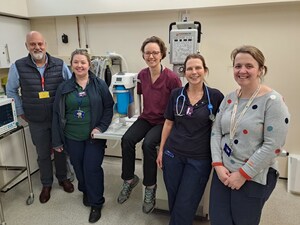Pets play important role in easing children's loneliness and stress intensified by virtual schooling in lockdown
- New survey highlights social, emotional and academic benefits for children during remote learning
- 83% of parents believe a pet helped their child feel less lonely and 73% felt their pet reduced stress caused by isolation away from classmates
- Nine in 10 parents reveal their pet has positively impacted their child's home-schooling experience
- As schools return, 80% believe pet interaction should continue in-person
BRUSSELS, April 10, 2021 /PRNewswire/ -- A new survey conducted by Mars Petcare of 2,000 parents across the UK and US shows family pets help children better manage feelings of stress and loneliness, which have been greatly exacerbated by virtual schooling as a result of the pandemic[1].
Around the world, 332 million children have lived under stay-at-home policies for at least nine months[2] and nearly 1.6 billion learners have been affected by disruption of in-person schooling[3]. There are early indicators that the pandemic has had a negative impact on children's social skills, productivity and well-being. Save the Children report that more than half of children who were separated from friends during the pandemic reported feeling less happy and more worried[4] and this shift to virtual schooling means students may have more distractions and less oversight, which can reduce their motivation[5].
For many families navigating the stress and challenges of home-schooling, pets have offered children crucial support. More than eight in 10 (83%) parents found that their family pet helped their child feel less lonely during lockdown, with more than three-quarters feeling that day-to-day interactions with their cat or dog reduced their child's stress and anxiety. Parents agreed their pet supported their child during the unprecedented break from in-person schooling by improving their mood, providing companionship and giving much-needed emotional support.
Pets may make the best study buddy
The survey also found that pets positively impacted a child's experience of virtual learning and academic performance across all ages – with nine in 10 parents seeing improvements in their child's emotional, social and core skill development including having more energy and improved concentration, providing a fun topic of conversation to engage with their classmates and teacher, and giving them a much-needed break away from the screen. More than half (56%) report having a pet helped improve their child's academic performance and 72% say their child is more motivated with a pet around[1].
"There are proven benefits to having pets in the classroom when it comes to improving children's confidence, focus and reducing their stress, but this survey shows that pets also played an important part in helping children emotionally as they come to terms with this unprecedented time away from their peers," said Mary Margaret Callahan, Chief Mission Officer of the leading therapy animal organisation Pet Partners. "We've been absolutely overwhelmed with the response from teachers, parents and students to our teams' virtual therapy animal visits during the pandemic. There is now an important role for animals in helping children adjust as they return to school."
More time together benefits wellbeing of children and pets
Equally, the survey revealed this increased bond between children and their pets has many benefits for the pet too. The results found 40% of children spent more than two hours of time with their pet each day during the pandemic (compared to just 21% before the pandemic) and the majority of parents (77%) believe their pet is also calmer now that they spend more time with their child.
"Talking or reading to a pet has been shown to help children to build confidence and connect with both peers and teachers. Exploring the important role human-animal interaction can play in a range of settings – from the classroom and office to the hospital or simply at home – is something we, at Mars Petcare, have been committed to for many years," said Kay O'Donnell, Vice President, Waltham Petcare Science Institute, the fundamental science centre for Mars Petcare. "It is wonderful to see these survey results reinforce how pets may help address the growing burden of loneliness and social isolation, which we know can be as detrimental to health as obesity, as well as indications pets have benefited from this additional time together."
"The pandemic was an abrupt change for my students and for education in general, and all educators were challenged to find new and creative ways to engage our classes," said Chris Koenig, Health and Physical Education Teacher in Oregon's Gresham-Barlow School District. "Adding Bella to my lesson plans for Pet Fridays has gone a long way in giving my students – and our dog – something positive to look forward to."
Majority of parents want pet interaction in traditional classrooms as a result
The survey also revealed that the majority (80%) of parents believe pet interaction should be used in schools as students begin to transition back to traditional classrooms and restrictions ease. Seventy-five percent of parents believed schools should invest more to bring controlled pet interaction into the traditional classroom setting.
Parents and teachers like Chris around the world have shared touching anecdotes relaying their personal experiences of having pets in the home classroom during the pandemic and how pets make it better.
You can follow the conversation about the research behind the many proven benefits of pets using #PetsMakeItBetter and by following Mars Petcare on social media.
Visit our website for expert advice about how to responsibly raise a happy and healthy cat or dog and how to help your pet through lockdown and beyond.
References
- Market Research Survey – Impact of pets in the home classroom, n=2,000. Conducted by Edelman Data and Intelligence (DxI) February 2021.
- https://www.unicef.org/press-releases/least-1-7-children-and-young-people-has-lived-under-stay-home-policies-most-last.
- Pokhrel S, Chhetri R. A Literature Review on Impact of COVID-19 Pandemic on Teaching and Learning. Higher Education for the Future. 2021;8(1):133-141. doi:10.1177/2347631120983481.
- https://www.savethechildren.net/blog/hidden-impacts-covid-19-children%E2%80%99s-mental-health#.
- https://www.edweek.org/technology/opinion-how-effective-is-online-learning-what-the-research-does-and-doesnt-tell-us/2020/03.
About the survey
This research was conducted by Edelman Data & Intelligence, a global, multidisciplinary research, analytics and data consultancy, between 19 February and 1 March 2021 with 2,000 respondents across the UK and USA. All respondents owned at least one cat or dog and had at least one child aged five to 17 years old in full time education and taking part in virtual schooling because of the pandemic.
About Mars Petcare
Part of Mars, Incorporated, a family-owned business with more than a century of history making diverse products and offering services for people and the pets people love, the 85,000 Associates in Mars Petcare are dedicated to one purpose: A BETTER WORLD FOR PETS. With 75 years of experience, our portfolio of almost 50 brands serves the health and nutrition needs of the world's pets – including brands PEDIGREE®, WHISKAS®, ROYAL CANIN®, NUTRO™, GREENIES™, SHEBA®, CESAR®, IAMS™ and EUKANUBA™ as well as The WALTHAM Petcare Science Institute which has advanced research in the nutrition and health of pets for over 50 years. Mars Petcare is also a leading veterinary health provider through a network of over 2,000 pet hospitals including BANFIELD™, BLUEPEARL™, PET PARTNERS™, VCA™, Linnaeus and AniCura. We're also active in innovation and technology for pets, with WISDOM PANEL™ genetic health screening and DNA testing for dogs, the WHISTLE™ GPS dog tracker, and LEAP VENTURE STUDIO accelerator and COMPANION FUND™ programs that drive innovation and disruption in the pet care industry. As a family business and guided by our principles, we are privileged with the flexibility to fight for what we believe in – and we choose to fight for: A BETTER WORLD FOR PETS.
Logo - https://mma.prnewswire.com/media/1484960/Mars_Petcare_Logo.jpg
Media contact (U.S.):
Alyssa Paldo
[email protected]
+1 (312) 973-2892
Media contact (UK):
Will Jobes
[email protected]
+44 (0)7449 819797
SOURCE Mars Petcare

Related Links
WANT YOUR COMPANY'S NEWS FEATURED ON PRNEWSWIRE.COM?
Newsrooms &
Influencers
Digital Media
Outlets
Journalists
Opted In





Share this article